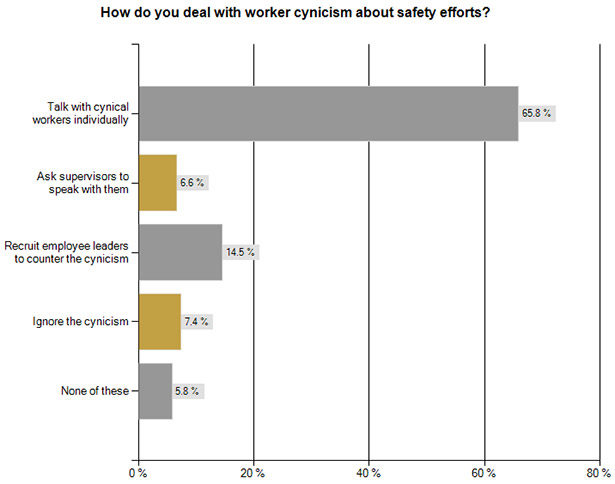What's your opinion on dealing with worker cynicism?

Post a comment to this article
Safety+Health welcomes comments that promote respectful dialogue. Please stay on topic. Comments that contain personal attacks, profanity or abusive language – or those aggressively promoting products or services – will be removed. We reserve the right to determine which comments violate our comment policy. (Anonymous comments are welcome; merely skip the “name” field in the comment box. An email address is required but will not be included with your comment.)
Title
July 12, 2013
I have found that a one on one friendly debate with the individual works best. This gives opportunity for both sides to state their concern. But, I have found that some individuals are just out for an argument.
Title
July 16, 2013
I tell them that it is in their best interest to have a safe work environment. I want to see everyone go home the same way they came to work "in one piece". It is better to spend money upfront to fix any safety problems then spending money to cover the expenses occurred due to an accident.
Title
July 19, 2013
Our utility has found that combining management support with engaging employees at all levels (I.e. employees train, contribute ideas, etc.) it helps create more buy in at all levels instead of being a downward push from our managers.
Title
July 23, 2013
If the employee is a chronic complainer then usually i would ignore them. If however this was engaged and thoughtful worker I would speak with them because they just might have some valuable feedback regarding our safety efforts.
Title
July 26, 2013
Recognizing associates come from different backgrounds where accidents might be a way of life, the one on one discussion focusing on what is indeniable, that safety is about protecting the associate and their family can be basically changing that associate's culture. often cynical associates need to have that one on one to show your committment and to boil it down to how it benefits the associate. It takes time, but a good investment.
Title
July 26, 2013
I like to take a two step approach, first I give the individual the opportunity to express their concern then I try to educate them on the merits of working safely, if I see no result/by-in I will then ask one of the more seasoned and respected workers to counsel the individual and try to make him/her understand that we want everyone to go home to their family everyday.
Title
August 1, 2013
Whenever I have the opportunity I speak directly to the employee - this is a 2-way conversation, but I want to ensure they understand that I am concerned about their personal safety and want them to remain safe for their families - this is not about the numbers. However, I also utilize other employees / natural leaders(their peers) to encourage safe behaviors and create an environment that is becomes reinforcing and sustainable.
Title
August 9, 2013
I will either talk to employees one on one or in a group situation. You always tend to have a few employees who have issues with safety, but you need to work with them to help make them understand what type of health hazards can take place if we do not work safely. Have used visual aids such as photos of accidents (some graphic) to help make the point. What I find is once they understand that their families and their best interest is your main concern you find their opinion changes.
Title
August 9, 2013
You have to talk individually to them, first of all. You enforce company policy verbally to the individual. They should already know this, but you have to cover all of the bases. Problem employees need that one-no-one contact, group meetings will not suffice.
Title
September 6, 2013
I've found in my line of work that a chronically cynical worker will remain that way as long as you allow it to happen. The sooner you are willing to engage the individuals behavior or attitude the less chance for it to spread. Success with this type of person will typically only happen by a face to face sit down casual environment. You have to find what actually motivates them personally and professionally and create a find a way to integrate your concerns with their passions. Some people just need help seeing the bigger picture.

